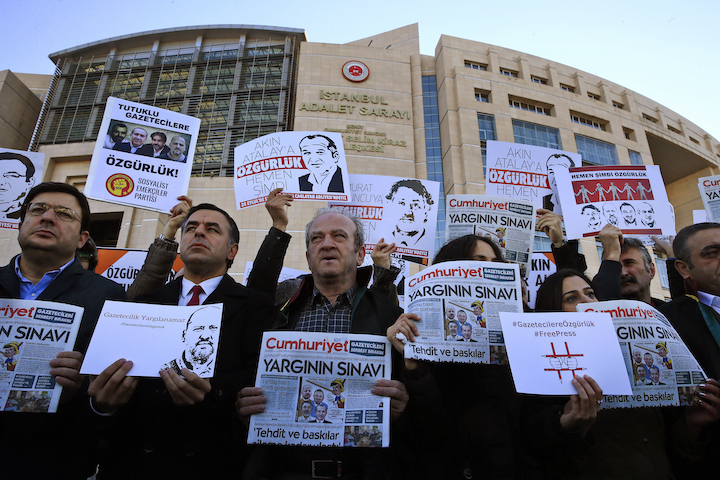Cracking Down on Creative Voices: Turkey’s Silencing of Writers, Intellectuals, and Artists Five Years After the Failed Coup

Demonstrators protest outside a court, where the trial of about a dozen employees of the Cumhuriyet daily newspaper on charges of aiding terror groups, took place in Istanbul, on October 31, 2017. Photo by AP/Lefteris Pitarakis
In this report, Cracking Down on Creative Voices: Turkey’s Silencing of Writers, Intellectuals, and Artists Five Years After the Failed Coup, PEN America outlines the legal mechanisms that the Turkish government has used to silence writers, activists, artists, academics, and creative professionals over the past five years. The paper shines a light on the devastating impact of the crackdown, urging the international community to demonstrate support and solidarity for Turkey’s creative community and push back against the Turkish government’s ongoing repression of freedom of expression.
For the report, PEN America interviewed more than a dozen members of Turkey’s literary, artistic, and human rights communities. Exiled Turkish writer Aslı Erdoğan described the government’s targeting of creatives as part of a “systematic approach towards cutting the vocal cords of society. How do you cut the vocal cords? You start with journalists, because they know the sins of the system. And then comes the turn of the columnists, the writers, artists, professionals, academics. It is actually quite a well-planned act, silencing an entire society. And it has worked, so far.”
Key Recommendations
- Given Turkey’s membership in NATO and the Council of Europe, the United States and EU should coordinate closely on policy responses on Turkey’s human rights violations.
- In its September session, the Council of Europe should trigger infringement proceedings against Turkey for failing to implement the European Court of Human Rights’ rulings regarding Osman Kavala and Selahattin Demirtaş.
- The United States and EU should increase high-level public diplomacy on individual cases, including the cases of writers, journalists, creatives, and dissidents.
- The U.S. Congress should consider passing legislation tying respect for human rights with any development and military aid to the Turkish government, and ensuring that any such aid or assistance is consistent with the Arms Export Control Act and Section 620M of the Foreign Assistance Act.
- The United States should increase support for Voice of America’s Turkish Service and Kurdish Service and consider new Turkey-focused programming through Radio Free Europe/Radio Liberty.
- The United States should increase funding for freedom of expression, independent media and press freedom, and cultural programming, including literary, artistic, and other creative initiatives in Turkey, as well as international cultural and academic exchange.






